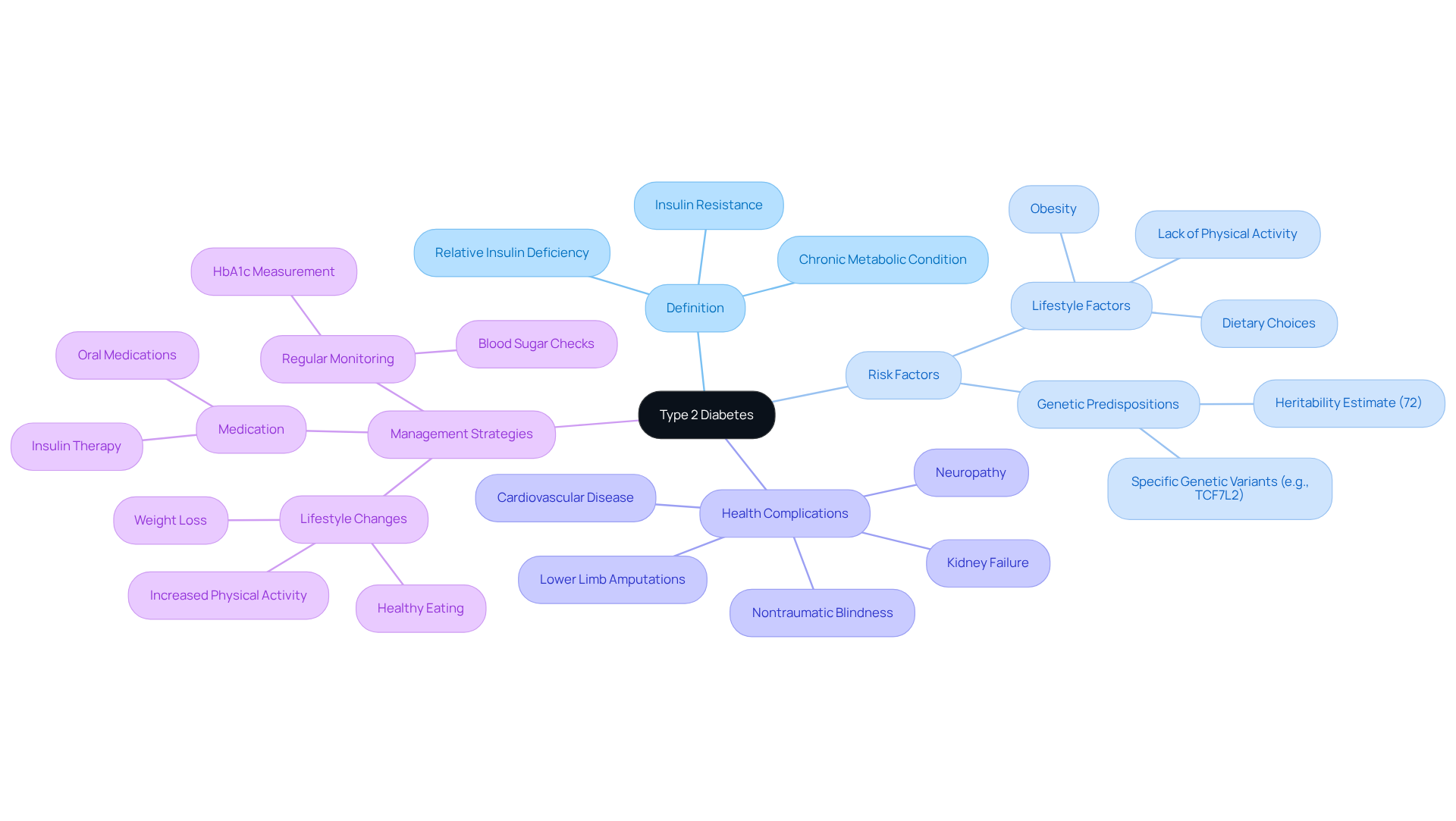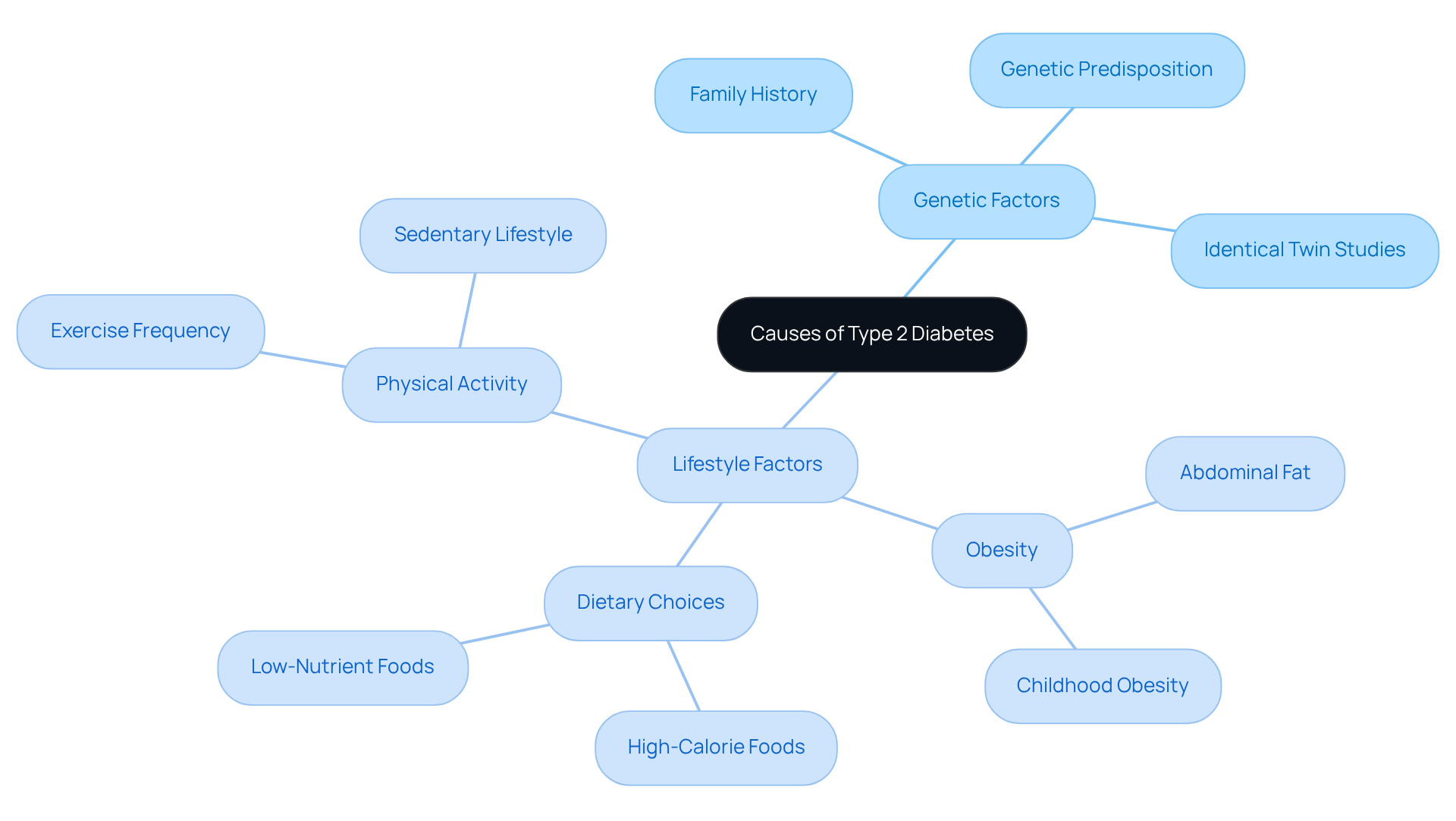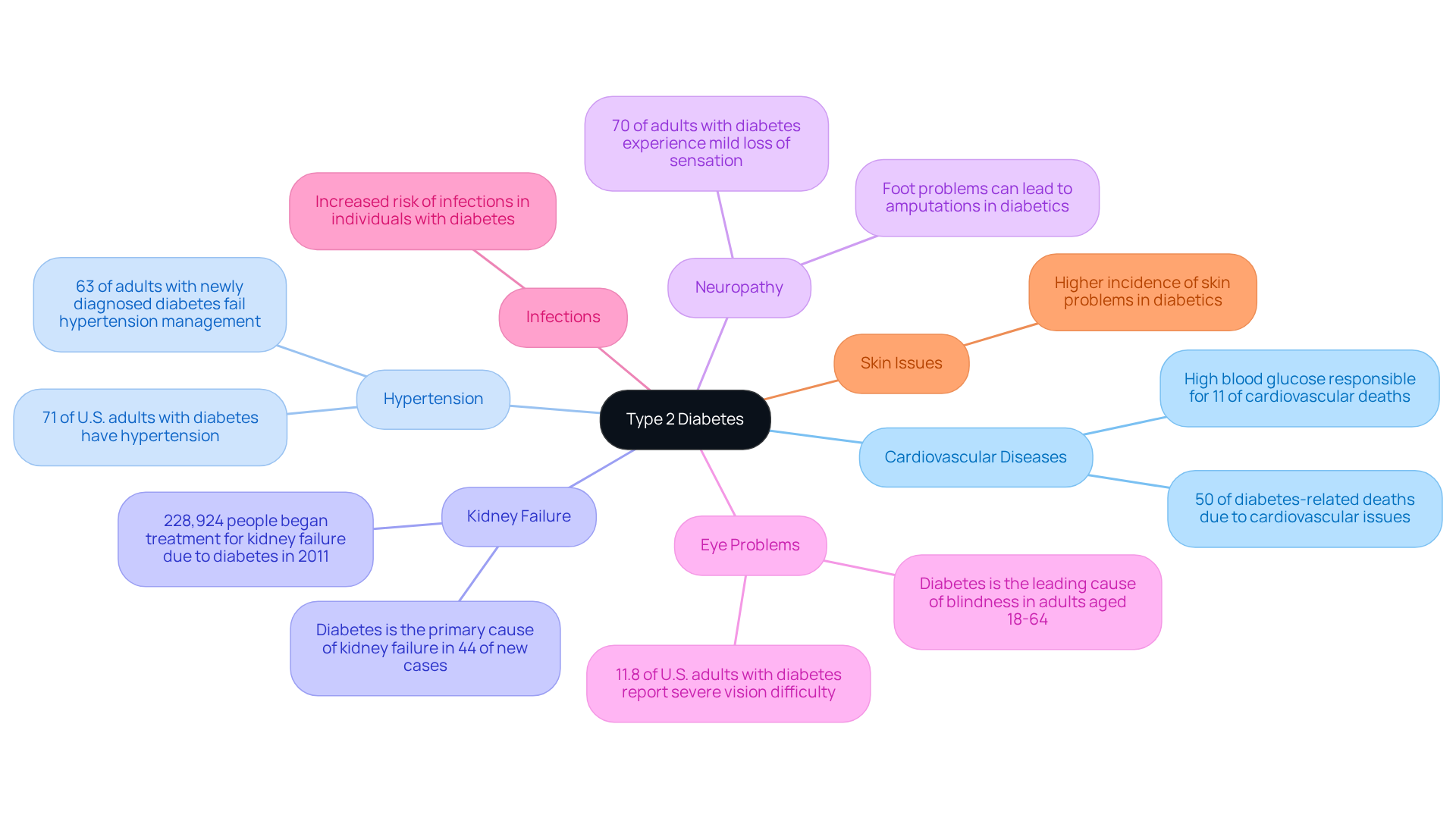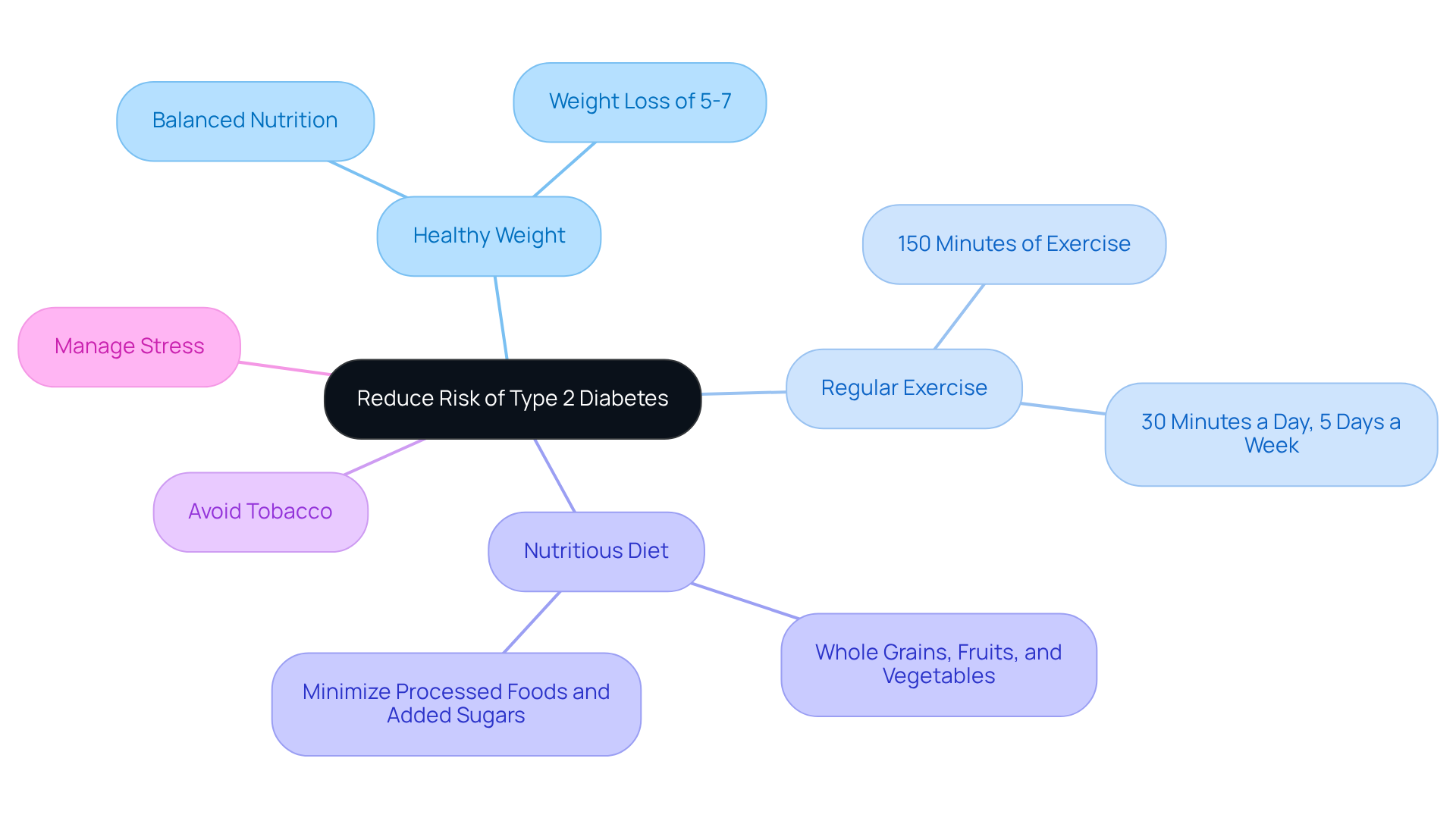Overview
This article addresses the important risk of Type 2 diabetes, a condition that affects many lives. It's understandable to feel concerned about its causes, health implications, and how to prevent it. Both genetic predispositions and lifestyle factors, particularly obesity and poor dietary choices, play significant roles in the development of this chronic condition. If not managed effectively, Type 2 diabetes can lead to severe health complications, such as cardiovascular disease and kidney failure.
You're not alone in this journey. Understanding the factors that contribute to Type 2 diabetes can empower you to make informed choices. We are here to support you every step of the way as you explore prevention strategies that can help you lead a healthier life. It's crucial to seek resources and support that resonate with your needs, as taking action now can make a significant difference in your health.
Introduction
Type 2 diabetes is often referred to as a silent epidemic, affecting millions worldwide and leading to serious health complications if not addressed. This chronic condition, deeply connected to our lifestyle choices and genetic factors, poses a significant threat not only to individual health but also to our public health systems. With the rise of obesity and sedentary lifestyles becoming more common, understanding the complex causes, risks, and implications of type 2 diabetes is more important than ever.
It's understandable to feel overwhelmed by this information. How can individuals navigate this intricate landscape to reduce their risk and improve their health outcomes? We are here to support you every step of the way. By seeking out resources and knowledge, you can take proactive steps toward a healthier life.
Define Type 2 Diabetes: Overview and Significance
Type 2 diabetes mellitus is a chronic metabolic condition characterized by insulin resistance and relative insulin deficiency, which increases the risk of type 2 diabetes by leading to elevated blood glucose levels. Unlike Type 1 diabetes, which primarily stems from autoimmune issues, Type 2 diabetes often develops gradually and is associated with lifestyle factors and genetic predispositions. This condition is significant not only because it accounts for approximately 90-95% of all diabetes cases but also due to its potential to lead to serious health complications, such as cardiovascular disease, kidney failure, and neuropathy.
It's understandable to feel concerned about these statistics. Individuals with a higher risk of type 2 diabetes face a two to four times greater risk of cardiovascular disease and may have a ten-year shorter life expectancy. Additionally, this form of diabetes, which underscores the serious health risks associated with it, is the leading cause of nontraumatic blindness in the developed world and highlights the risk of type 2 diabetes. Understanding this condition is vital for effective management and prevention strategies tailored to individual needs, as outlined in the NICE guidelines.
The Severity Score (DISSCO) is a helpful tool that can assist in identifying declines in blood sugar levels, allowing for timely interventions. By fostering awareness and understanding of Type 2 diabetes, we can enhance health outcomes and improve the quality of life for those affected. Remember, you're not alone in this journey; we are here to support you every step of the way. Seeking information and resources is a positive step forward, and together, we can navigate this path.

Explore Causes of Type 2 Diabetes: Genetic and Lifestyle Factors
The reasons for this form of diabetes can be complex, often stemming from a blend of genetic factors and lifestyle choices. If you have a family history of diabetes, it's understandable to feel concerned, as this significantly increases your risk of type 2 diabetes. Genetics plays a vital role in this disease's development, but lifestyle factors, especially obesity, are equally important. Excess body fat, particularly around the abdomen, is linked to increased insulin resistance, which complicates your body's ability to manage blood sugar levels effectively. It's alarming to note that rising obesity levels among children and adolescents have led to a troubling increase in cases of diabetes in younger populations.
Nutritionists remind us that poor dietary choices, such as consuming high-calorie, low-nutrient foods, along with a lack of physical activity, can further heighten this risk. Studies show that making lifestyle changes, like losing weight and increasing physical activity, can reduce the incidence of Type 2 Diabetes by nearly 60% over four years. It's inspiring to see case studies where individuals who adopt healthier eating habits and maintain a consistent exercise routine can significantly delay or even prevent the onset of the disease.
Understanding these causes is crucial for recognizing your own risk of type 2 diabetes and taking proactive steps toward prevention. By fostering awareness about the effects of obesity and lifestyle choices, you can make informed decisions that lead to improved health outcomes and a lower risk of type 2 diabetes. Remember, you're not alone in this journey; there are resources and support available to help you every step of the way.

Assess Implications of Type 2 Diabetes: Health Risks and Complications
If not effectively managed, there is a significant risk of type 2 diabetes, which can lead to a multitude of serious health complications. It's important to understand that among these, cardiovascular diseases like heart attacks and strokes, as well as the risk of type 2 diabetes, are particularly alarming. Research shows that around 50% of people with diabetes perish due to cardiovascular-related problems, which emphasizes the risk of type 2 diabetes. High blood glucose is responsible for about 11% of cardiovascular deaths, highlighting the direct link between diabetes management and the risk of type 2 diabetes as well as cardiovascular health outcomes.
This challenge becomes even more concerning when we consider that over 71% of U.S. adults with hypertension also face a risk of type 2 diabetes. Unfortunately, the management of hypertension fails in up to 63% of adults who have recently been diagnosed with diabetes, which raises their risk of type 2 diabetes. Additionally, the primary cause of kidney failure in 44% of all new cases in 2011 was diabetes, highlighting the risk of type 2 diabetes. It can also lead to nerve damage (neuropathy) and eye problems, including diabetic retinopathy, which is a leading cause of blindness among adults aged 18-64, and is associated with an increased risk of type 2 diabetes.
Moreover, those with a risk of type 2 diabetes have an increased chance of infections and skin issues. It's staggering to note that over 60% of nontraumatic lower limb amputations occur in people who face a risk of type 2 diabetes. These complications highlight the critical need for regular monitoring and proactive management of blood sugar levels to mitigate the risk of type 2 diabetes. Remember, early intervention can significantly reduce the likelihood of long-term damage and the risk of type 2 diabetes, while improving overall health outcomes. You're not alone in this journey; we are here to support you every step of the way.

Implement Prevention Strategies: Lifestyle Changes to Reduce Risk
Making lifestyle changes to mitigate the risk of type 2 diabetes can feel overwhelming, but it's essential for improving your overall well-being. By focusing on a few key strategies, you can take significant steps toward a healthier life. Aim to achieve and maintain a healthy weight through balanced nutrition and regular physical activity. Try to include at least 150 minutes of moderate exercise each week in your routine. A diet rich in whole grains, fruits, vegetables, and lean proteins while minimizing processed foods and added sugars is crucial. Research indicates that those who adopt these eating patterns can reduce their risk of type 2 diabetes by nearly 60%.
It's understandable to feel challenged by these changes, but remember that avoiding tobacco use and managing stress levels effectively can further lower your risk of type 2 diabetes. By embracing these lifestyle adjustments, you not only decrease your risk of type 2 diabetes but also enhance your overall well-being, paving the way for a more active and fulfilling life.
You're not alone in this journey. T2DSolutions serves as a valuable resource hub, offering educational materials and community support to help you implement these strategies effectively. We are here to support you every step of the way.

Conclusion
Type 2 diabetes represents a significant public health challenge, characterized by insulin resistance and increasing blood glucose levels. Understanding this condition is crucial, as it affects many individuals and poses serious health risks, including cardiovascular disease, kidney failure, and neuropathy. By recognizing the complexity of its causes—ranging from genetic predispositions to lifestyle choices—you can better appreciate the importance of proactive management and prevention strategies.
The article highlights several key factors that contribute to the risk of developing type 2 diabetes, including:
- Obesity
- Poor dietary habits
- Lack of physical activity
It’s alarming to see the rise in obesity rates among younger populations. However, it’s important to know that lifestyle modifications, such as adopting healthier eating patterns and engaging in regular exercise, can significantly reduce your risk of developing this chronic condition. The implications of untreated type 2 diabetes are profound, leading to complications that can severely impact your quality of life.
Ultimately, taking actionable steps toward prevention is essential for improving health outcomes. By prioritizing a balanced diet, regular physical activity, and stress management, you can significantly mitigate your risk of type 2 diabetes. Remember, resources and community support, such as those provided by T2DSolutions, are invaluable in this journey. Embracing these lifestyle changes not only enhances your well-being but also contributes to a healthier society. You are not alone in this journey—together, we can make informed choices that lead to a brighter, healthier future.
Frequently Asked Questions
What is Type 2 diabetes?
Type 2 diabetes mellitus is a chronic metabolic condition characterized by insulin resistance and relative insulin deficiency, leading to elevated blood glucose levels.
How does Type 2 diabetes differ from Type 1 diabetes?
Unlike Type 1 diabetes, which primarily results from autoimmune issues, Type 2 diabetes often develops gradually and is associated with lifestyle factors and genetic predispositions.
What percentage of diabetes cases does Type 2 diabetes account for?
Type 2 diabetes accounts for approximately 90-95% of all diabetes cases.
What are some serious health complications associated with Type 2 diabetes?
Serious health complications associated with Type 2 diabetes include cardiovascular disease, kidney failure, and neuropathy.
How does Type 2 diabetes affect life expectancy and cardiovascular risk?
Individuals with a higher risk of Type 2 diabetes face a two to four times greater risk of cardiovascular disease and may have a ten-year shorter life expectancy.
What is the leading cause of nontraumatic blindness in the developed world?
Type 2 diabetes is the leading cause of nontraumatic blindness in the developed world.
Why is understanding Type 2 diabetes important?
Understanding Type 2 diabetes is vital for effective management and prevention strategies tailored to individual needs.
What tool can help identify declines in blood sugar levels in individuals with Type 2 diabetes?
The Severity Score (DISSCO) is a helpful tool that can assist in identifying declines in blood sugar levels, allowing for timely interventions.
What resources are available for those affected by Type 2 diabetes?
Seeking information and resources is encouraged, and support is available to help individuals navigate their journey with Type 2 diabetes.



